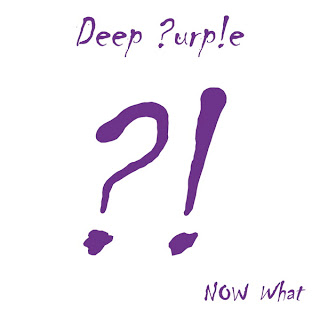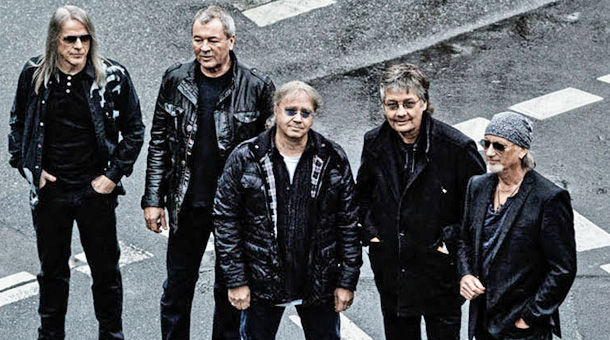
Let’s start with a bit of an opinionated, music snob mini-rant: Deep Purple is one of the most important and too-oft overlooked bands in rock history. If one looks at their obvious and strong influence on hundreds of bands and the multitude of musicians who flat-out credit Deep Purple with inspiring them to do what they do, it’s shocking how frequently their music is completely absent from the collection of many rock fans. Quite often, the average music fan can’t name a song of theirs beyond “Smoke On The Water,” which is just sad, especially considering that Deep Purple has experienced fairly consistent commercial success. We’re talking about a band that basically set the standard for how to integrate keyboards into rock music in a really cool, non-cheesy way, and is one of the holy trifecta of groups that carved out the basic structure of what would become heavy metal (the other two being Black Sabbath and Led Zeppelin). Listen to any hard rock or metal riff of the last 30 years, and you can probably find one that sounds almost just like it that was played first by Deep Purple.
I point this out because one of the biggest challenges for Deep Purple over the years has been trying to stay relevant in a changing musical landscape, essentially filled with their own, sometimes very talented, offspring (even if sometimes these bands are bastard children with no real knowledge of the roots of the music that they’re playing). Their level of success in doing this has been a mixed bag over the past 20 years or so, but when the writing has been honest (e.g., The Battle Rages On, Purpendicular) and not an attempt at trend-following (e.g., Slaves and Masters), the result has been every bit as good as the 60s and 70s-era music that garnered them a cornerstone credit in rock history.
 So that brings us to the topic at hand, Now What?!, their first studio album in several years, and the fifth with current uber-axeman Steve Morse. The question is does it hit like the first couple of Steve-era albums (Purpendicular and Abandon), or become a confusing mixed bag like the past couple of offerings (the last being the sometimes-brilliant-but-largely-overwrought Rapture of the Deep, and its messy, scattered predecessor, Bananas). There is good news here, and I will go out on a limb here and call this the best collection from the Purples since Purpendicular, and perhaps since Perfect Strangers.
So that brings us to the topic at hand, Now What?!, their first studio album in several years, and the fifth with current uber-axeman Steve Morse. The question is does it hit like the first couple of Steve-era albums (Purpendicular and Abandon), or become a confusing mixed bag like the past couple of offerings (the last being the sometimes-brilliant-but-largely-overwrought Rapture of the Deep, and its messy, scattered predecessor, Bananas). There is good news here, and I will go out on a limb here and call this the best collection from the Purples since Purpendicular, and perhaps since Perfect Strangers.
The thing that makes Now What?! work is its practically seamless blending of the newer hard rock style introduced in the late 90s at the beginning of the Morse era with the 70s sound that made them a powerhouse act in the first place. By embracing all of their component parts, the end product sounds reinvigorated, authentic, and inspired. The playing throughout is superb, reestablishing the level of musicianship expected from such veteran musicians. Ian Gillan’s voice sounds as good as it ever has; he even throws in a few of his trademark high screams, which he handles solidly, something that is very impressive considering that this guy is in his sixties. Morse’s playing is alternatingly mind-bendingly unfathomable and then tasteful and understated, which is one of the things that makes him such a great guitar player: amazing ability in terms of chops, but with the maturity and self-restraint to not overplay all of the time. Roger Glover is solid as a rock, switching between being a straight-up timekeeper to playing full counterpoint melodies on bass. Ian Paice’s drumming is especially impressive on this album, with everything he touches being almost perfectly placed (and, like Morse, done with the knowledge of how not to overplay) – in fact, my only complaint with his part of this album is that sometimes he’s too far back in the mix, and there are times they should have let him be a little more thunderous. And last, but not least, we all miss Jon Lord, but his replacement, Don Airey, has obviously spent a lot of time studying Jon’s playing style, because when he plays organ parts, he sounds exactly like Lord. And, when he brings the synth sounds, he makes good patch choices, rarely getting cheesy (with the one exception being the trumpet sound that introduces and plays throughout the chorus each time on Uncommon Man, something that is understandable given the theme of the song and its suggestion of, perhaps, the modern concept of royalty; the track otherwise works well).
So here we have a veteran band in proper playing form, which is a good thing. But, the songwriting is what really makes this album come together in ways that the past couple have not. The album is a smidge front-loaded with the big rockers, but that’s ok; you wouldn’t want a Deep Purple album to start out too delicately, anyway. The Purples open with A Simple Song, a big, heavy, riff-rocker that has great solo-and-bridge payout, but doesn’t take the tempo too high too soon. It’s followed with perhaps the best of the rockers on the album, Weirdistan (which is probably not about what you think it’s about), and here the band kicks it up a notch in intensity and proves that, despite their aging status, they can completely bring the power, noise, and tempo. The rock organ here is badass, and Morse lays down heavy riffing…the album is off to a smokin’ start.
These opening tunes are followed by a couple more rockers, the mid-tempo Out of Hand, another winner, and Hell To Pay, which is the primary place where one hears the eighties Perfect Strangers sound come through. It features big gang vocals on the chorus, which usually make me cringe a little, as many bands go too far over the top with them and things slide into cheeseball territory. Here, however, given the overall eighties vibe, it works pretty well on this straight-up rocker.
Bodyline is a swing-based number, and, much as its name suggests, sounds like a stripper song and features an appropriately sleazy riff. The band sounds great on this song, but it’s also the only place on the album where the lyrics feel a little contrived, and perhaps even a little too creepy, as having a sixty-something-year-old-man singing about watching some girl’s “bodyline” while she’s dancing is a bit lecherous. Now, I’m sure that good ol’ Ian still can get it done and we shouldn’t commit ageism here and pretend he isn’t allowed to admire an attractive woman, but it does dance up to a (probably unfair) line someplace, and for some it might make this track even a bit silly and skippable…which is too bad, because the playing on this one is really great.
After that singular lyrical misstep, however, Gillan gets back to fantastic, naturally-fitting vocals through to the end of the album. Literally everything is good, but a couple of big winners to point out are Blood From a Stone, a bluesy bit of melancholy pondering that is one of the most moving parts of the entire collection, and All The Time in the World, which is the most uncontrived, beautifully sung ballad (including the backing vocals) that Deep Purple has recorded in years. Vincent Price is a gimmick track, but gloriously so, leveraging the rock organ history of Deep Purple, with Don Airey having tons of fun playing eerie [Eerie Aiery: a new nick name for Don?] riffs apropos of Price-era horror flicks. Most gimmick tracks are a one-or-two-time listen, but I find myself playing this one with every subsequent spin through the album with a grin on my face.
Deep Purple wraps up the album with It’ll Be Me, which is a stylistically different track for the band, with a genre that’s difficult to pin down. Is it blues? Country? Zydeco? Methinks it’s a bit of each, and lots of fun, featuring piano and organ, Georgia Satellites-inspired guitar riffing, and countryesque vocals and baseline. Yep, different for sure, but an entertaining way to wrap things up.
The end result is by far the most interesting and consistently good albums that Deep Purple has released in years. From the phenom-level arpeggio runs on both guitar and keys to the perfectly played and integrated rhythm section to the best-sounding vocals since the nineties, this is a modern Deep Purple album that any fan of the band should own, and even perhaps a good place for new listeners to start in terms of their modern catalog. What’s even better, however, is knowing that this group of guys who has been doing this for over forty years can still channel the fire and release an album that feels inspired and original. It gives me hope that we’ll see future releases from other now-aging genre-defining bands like Radiohead, Social Distortion, or Van Halen that feel as fresh and important as the albums that established their popularity in the first place.
Rock on, Deep Purple. Rock on.
[spotify play=”spotify:track:36zvcjMI4g6RFqxyvlaxlu” size=”300″ sizetype=”width”]


1 comment
Heather Kane says:
Aug 11, 2013
Speakin’ the truth. Such a great album. Deep Purple still rule for this chick!